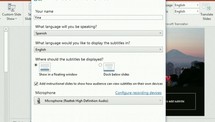Free Translation Tools and Resources for Online Translators
The translation is one of the industries that were greatly affected by technological development and the internet, making the work of a translator much easier and faster. Searching for a word in an online dictionary takes a few seconds while it can take several minutes to find something in a printed one. So to be productive a translator needs to be familiar with online translation tools that optimize the working process.
Some of the software for translators is rather pricey, which can be an obstacle for many beginners in the industry such as students or freshmen. Hopefully, there are many tools available online and for free. Here is the list of some of the high-quality resources for translators that are free of charge.
Dictionaries
Probably this is the most integral tool in translation that does not require any explanation. However, it should be mentioned that apart from mono- and bilingual dictionaries, translators might also need specific glossaries and thesauruses.
- Multitran is one of the best tools for translating individual words and phrases in free access. Its main feature is that this multilingual dictionary is compiled by translators and contains many categories in which one word may have different meanings. One can also register and get some help on its forum.
- Thesaurus.com is a tool for finding synonyms. This might be especially helpful in translating some literary works. The tool offers several synonyms while indicating the degree to which each variant is close to the meaning of the original word.
- WordReference.com is a web dictionary that supports many languages and provides both definitions and translations from dictionaries such as Collins or Oxford. It supports 17 languages and aims to expand its database. One can also take part in the discussions and visit its forum.
These are the tools for some general purposes. Some specific types of work might also require some other resources such as rhyme dictionary or domain-specific dictionaries, such as a medical dictionary.
CAT tools
Of course, Google Translator is of no particular use for professionals. However, it does not mean that CAT tools are not effective. In fact, they can considerably decrease the time spent on translation and help to optimize the work algorithm for a translator.
- MemoQ provides a computer-assisted translation environment for translators. It is not completely free but it has a full 45-day trial version and a limited free edition for translators. Although the free version has limitations, it can be of great use for a beginner and can also help to decide whether to use CAT tools and consider buying the full edition.
- Smartcat is a tool that combines a full set of instruments designed to help translators in the working process such as access to over 11 machine translation engines and API integrations. It makes the work easier and more effective by providing powerful technologies for translation that are free of charge. Smartcat also has a paid plan but the good news is that it does not have significant differences but only some exclusive features.
Q&A
By learning languages, one also learns about life. Translation often is about human interactions in different cultural settings which sometimes requires extralinguistic knowledge to provide an accurate translation. Unfortunately, not all the information on the web can be trusted. Also some services like Yahoo! Answers are not very helpful. But there are resources that can be considered reliable and are free of trolling.
- Quora is a popular Q&A website where one can get an answer from a professional or a knowledgeable person on almost any topic. There is also a possibility to search through the already answered questions. Although there is much entertaining content on the website and many questions are asked for fun, still, this is a good resource with a big community.
- ProZ.com KudoZ serves as a forum for the translator’s community. This website allows you to take part in discussions and ask 5 questions a day to get help from fellow professionals in translation or explanation of some words or phrases.
If the information you need is way too specific, the best place to seek help would be a forum dedicated to this particular topic.
Job boards
Freelance job boards are a rather competitive environment. Oftentimes, the bidding process works for those who offer a lower price and corresponding quality. However, it is still possible to find some orders on platforms such as Upwork with the help of building a strong profile and creating a portfolio. When a potential employer has the possibility to see some examples of your work, he/she is more likely to choose you for their project even when you do not have any feedback.
Some other platforms for job search are:
- TranslatorsCafé is a platform aimed to connect professional linguists and employers. One can also find some useful resources and a discussion board there.
- ProZ.com is another well-established and long operating website for translators to find clients. The competitiveness on the platform is rather high so it might be suitable not for those who translate to popular languages.
- Fiverr is another freelance platform similar to Upwork. The translation is one of the most popular categories there and the number of offers is vast. However, the competition on the platform is rather high as well.
Read also: Find the best Swedish to English translation company with experienced translators.
Blogs and Facebook groups
Community is one of the important aspects of work. When one is working at the office the community is constituted by the colleagues. But when one works online it is also necessary to connect with fellow translators. On forums, in Facebook groups, and in comments in blogs one can ask for some help, share some experiences, find valuable feedback regarding some company, and many more.
Here are some blogs that might be interesting for translators:
Groups in Facebook that can be useful:
- Continuous Training (CPD) & Events for Translators and Interpreters is a public group for those who wish to learn and connect with other translators.
- Linguria the world of translators/interpreters can be used for fun, information sharing, and many other purposes.
- Glossarissimo provides many valuable resources for translators.
There are also many thematic groups such as Legal Translation. If you work in a specific field, you can easily find your community on Facebook.
Planning and Scheduling
Good planning is one of the main prerequisites of success. It may be not easy to keep everything in mind or jot down some ideas in the notebook every time they cross your mind. The solution is to use tools for planning and schedule to make oneself more organized and focused.
- Google Calendar can be used to set deadlines, notifications, and reminders when working on some projects. It often happens that if the deadline is far, people tend to procrastinate until the very last day when the given time is not enough for successful completion. When you make sure to remind yourself what amount of work should be done each day, you can easily manage your own workload and your time.
- Evernote can be used to write down some ideas when working. It is a convenient way to keep all the notes in order.
Text Editors
Microsoft Word is one of the most convenient text editor programs. But the issue about it is that it is pricey. A good free-of-charge alternative is OpenOffice. Its functionality and the interface are similar to those of Word and it is convenient to use. For those who need to work with website or app localization, a good instrument would be Notepad++. It is an open-source text editor that supports most of the programming languages and HTML: it highlights different units in different colors making it convenient to look through and edit the text.
Proofreading is always a necessarily long process of error-detection. However, this process can be optimized with the use of some spell checkers and quality text editors. The best free-access solution in this category is Grammarly. This is a powerful AI spellchecking instrument that detects grammar issues in a long text in seconds. It also provides an explanation of the issue and can correct the mistakes automatically. Grammarly also has paid plans but for the purpose of correcting grammar, the free version is more than enough.
Find Inspiration
The work of a translator often requires using creativity. Apart from this, the active work of the brain may often get one too tired and even cause burnout. In order to stay healthy, happy, and motivated one needs to get some inspiration. The question here is: where to find it?
In fact, inspiration can be rather spontaneous. But there are some ways to evoke it when needed. You can start by listening to music on YouTube. Don’t listen only to the one you like, try out different genres. You can also look at the pictures on Instagram and Pinterest. Some images can evoke some strong associations and drive one’s fantasy.
Read also: The best translation site with the access to the essential translation tools.
Final Thoughts
As demonstrated above, the free tools for translators nowadays are numerous. One can find anything from tools for the job to entertaining content in any specific field. The online community of translators online is rather big so one can always expect to get some piece of advice and support from fellow translators.












